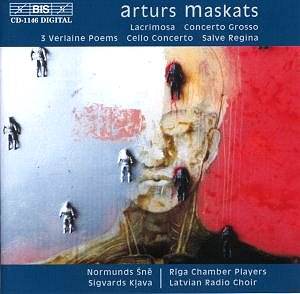The music of the Baltic states continues to fascinate
me hence my decision to review this very recently arrived disc.
Maskats, a Latvian, began composing while at
school. His 1980s were spent in the Daile Theatre - a hard apprenticeship
during which he evolved his own principles for composition. These
were built on his tuition with Valentins Utkins at the Latvian
Academy of Music. He is currently artistic director of the Latvian
National Opera. Despite his theatrical accent he is strongly drawn
to the symphony. His first was written in 2000 and he cherishes
hopes of writing at least four. The Salve Regina, Verlaine
poems and his music for the stage adaptation of that wonderful
novel of jealousy and revenge Thérèse Raquin
won for him the Latvian National Music prize in 1996. Intriguingly
Maskats sees himself in the same landscape as Pärt, Vasks
and Kancheli. His articles of faith include a statement that music
must first of all be beautiful. Maskats is also drawn to dance.
He comments that the nineteenth century and the first half of
the last century had the waltz as their dance hallmark. Maskats
sees the tango as the mark of life in the second half of the last
century into the current century. The Tango is 'life itself'.
The Maskats works on this CD are all from the
1990s. Three of the five involve the human voice. Two of these
include the chamber ensemble. Both the Lacrimosa and the
Salve Regina are quite short. The latter is for a powerful
mezzo voice, cello and chamber orchestra.
The Lacrimosa was written to mark
the tragedy that was the sinking of the ferry 'Estonia' in 1994.
More than 800 lives were lost. Ethereal female voices enter with
a palpable sense of cavernous space and distance around them.
There is a rasping murmur of strings and moments of awesomely
gothic melodrama for both choir and organ. Other episodes include
the infinitely tender comfort of the singing at 2.53, an underpinning
ostinato like that in Sibelius's Luonnotar and a
Terhenniemi-like mystery (compare Klami's Kalevala Suite).
These are evanescent impressions of a work that instantly tightens
its grip on the listener. My own notes were made before I read
the booklet but I quote from them in relation to the closing moments
of this piece: 'the exhaustion borne of grief.'
The Salve Regina sounds like lyrical
late Tippett in the solo vocal line. The model is perhaps the
baroque cantata - a Bach cantabile fused with a surgingly
melodic energy. The cello speaks for suffering; the voice as balm.
This piece was originally conceived for Reinis Berzieks' cello
with strings. Maskats then came across the ancient Salve Regina
text which seemed a contrasting gemini to the cello's admonitory
grieving.
With a title like Concerto Grosso I
am bound to think back to the Schnittke of the early 1980s ...
and there are some echoes! Maskats' work is in five movements
of which two are buttressing adagios. The work’s origins
are drawn from visits to the Armenian town of Dilijan in which
both Shostakovich and Britten gained inspiration. The sub-title
is Return to Dilijan, itself a variant on the title of
the Albert Camus poem, Return to Tipaz. The two adagios
use a slowly insistent theme for solo violin. This theme is high
and caustic. It conveys the sense of a slow turning in the wind
and then an unwinding; mesmerisingly palindromic like a similar
device in the slow central section of Peter Racine Fricker's Vision
of Judgement. There are neo-baroque episodes, moments that
sound like Vivaldi on steroids, spiritual bell sounds, lonely
acidic violin and cello solos, grinding romantic thunder and a
vertiginous ascent into stratospheric and valedictory silence.
While the notes claim a French approach, with
one exception, I did not hear this and certainly not in Maskats'
setting of Verlaine. Here the writing for the choir
takes us into the ether. The humanising eminence is the grainy
sorrow-sweetness of Normunds Šnē's
oboe solo which appears constantly throughout this most enchanting
of works. There are moments where the inspiration of Šnē,
Maskats and the choir have us wondering at the seamless transition
from oboe to choir and back. There is brilliance in the
middle poem but the flanking sections are ecstatic-reflective
in a way that recalls Debussy's Charles d'Orleans choral
settings.
The five movement Cello Concerto is
an allusive work. Here the allusions are to the two cello concertos
of Jānis Mediņš and to Marija Mediņa (the
daughter of Jēkabs Mediņš and the niece of Jānis).
The soloist here premiered this work and also played the cello
at Marija's request during her last days. The concerto was written
six months after her death. Berzieks premiered the piece
in France in 1992. The work is deeply serious, with a cello part
that is cantorial, often hoarse with sorrow, lugubrious and hieratic.
This is a potently sincere piece the effect of which is amplified
by its relative conciseness. Those who enjoy the named works of
Kancheli (on ECM) and parts of the Sallinen Cello Concerto will
find this well worth hearing.
I am grateful to conductor and oboist Normunds
Šnē for making this review copy available to me. This
approach came about as a result of my reviews of CDs of the music
of Ugis Praulins.
This being a Bis production the notes are in
English, Latvian, German and French although the translations
of the sung texts are only into English. Is English taught as
the prime second subject in Latvia, I wonder.
The experience of Maskats music is res ipsa
loquitur evidence of an entanglement with the expression of
beauty. This is not honey-choked commercialism but certainly stands
at the opposite pole from the sollipsistic universe of academic
avant-garde cliques. Valuable and sincere music with the power
to speak directly.
Rob Barnett
Maskats music is res ipsa loquitur evidence of an entanglement
with the expression of beauty. ... see Full Review

